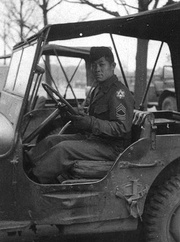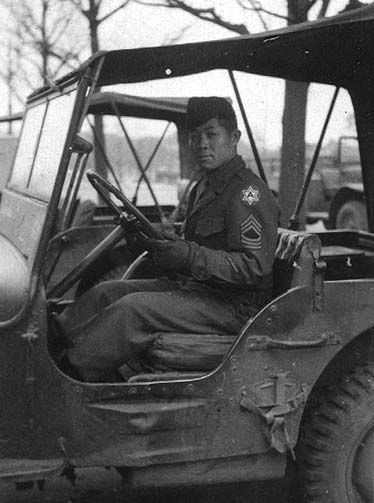
Japanese American Military Experience Database

Jimmie Masaharu Matsumura
41st Div.
4th Army Military Intelligence School, Presidio, San Francisco (Graduated Nov. 1941)
Intelligence School Instructor, Camp Savage, MN.
Far Eastern Div. G-2, Pentagon, Washington D.C.
GHQ, Tokyo, Japan
Military Intelligence School Instructor
Other Countries: Guam Island; Central Pacific; Japan
Also performed duty as a court monitor as well as an investigator for the A, B, C, D classes of the Far East Military Tribunal to see to it that court interpretations were being carried out correctly. I frequently left for field investigation to the Sugamo Prison and rural areas whenever it was necessary to get documentary evidence.
Army Commendation Medal (for Meritorious Achievement)
Good Conduct Medal with Clasp (maintained excellence and efficiency ratings for three years)
American Defense Service Medal
American Campaign Medal
Asiatic-Pacific Campaign Medal
World War II Victory Medal
Army of Occupation Medal
Japan...The eight commendations were received from Maj. Gen. Karl Truesdell, Commandant of the Command and General Staff School, Fort Leavenworth, Kansas, Brig. Gen. P.E. Peabody, Chief of the Military Intelligence Service of the War Dept. and Colonels connected with various Intelligence Agencies for my intelligence assignments and for giving lectures to 600 Allied officers regarding 'Prisoners of War' and 'Enemy Documents at the Command and General Staff School.'
Secondly, I was constantly concerned about the well-being of my parents and brother confined at the cold Heart Mountain internment camp in Northern Wyoming.
Although I was a master sergeant (top non-commissioned rank), I kept my cool and told him that I represented Col. Kai E. Rasmussen, the school Commandant, and carried out his direction. He started to use vulgar words and said that we Niseis started the war against the United States and sided with Japan.
I left the classroom immediately and reported the incident to the Commandant and Maj. John F. Aiso, Director of Academic Training. Col. Rasmussen called the alcoholic officer to his office and after listening to both sides, he severely reprimanded him for his unofficer-like behavior and warned him of possible demotion. On Commandant's insistence, the officer apologized and shook hands with me and that was the end of it. Without Maj. Aiso's legal efforts, I know this would not have settled peacefully. I am very grateful to John, even to this day, over fifty years later. I grieve John's untimely death, and I miss him a great deal.
I would like to say that the promotion system of the U.S. Army was very discriminatory and unfair. A few white privates whom I failed in my class were later commissioned and out-ranked me upon their graduation from the Camp Savage Intelligence School. Although they were division chiefs of the G-2 Section, Pentagon, when I was assigned there, they were not qualified to serve in that capacity because we Niseis had to help perform their duties. As I was a top ranking non-commissioned officer, I had to help them especially on Japanese SOSHO writing and translation.


